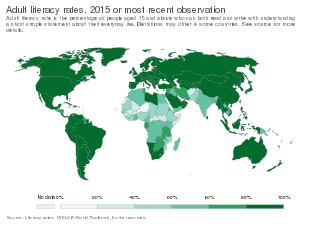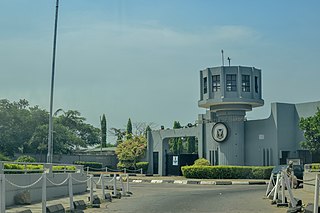
Literacy is the ability to read and write. Some researchers suggest that the study of "literacy" as a concept can be divided into two periods:the period before 1950,when literacy was understood solely as alphabetical literacy;and the period after 1950,when literacy slowly began to be considered as a wider concept and process,including the social and cultural aspects of reading and writing and functional literacy.

The University of Ibadan (UI) is a public university located in Ibadan,Oyo State,Nigeria. Initially founded as University College Ibadan in 1948,it maintained its affiliation with the University of London. In 1962,it became an independent institution,making it the oldest degree-awarding university in Nigeria. The University of Ibadan has significantly contributed to Nigeria's political,industrial,economic,and cultural development through its extensive network of graduates.

Education in Nigeria is overseen by the Federal Ministry of Education. The local authorities take responsibility for implementing state-controlled policy regarding public education and state schools. The education system is divided into Kindergarten,Primary education,Secondary education,and Tertiary education. Nigeria's federal government has been dominated by instability since declaring independence from Britain,and as a result,a unified set of education policies is yet to be successfully implemented. Regional differences in quality,curriculum,and funding characterize the education system in Nigeria. Currently,Nigeria possesses the largest population of out-of-school learning youths in the world. The educational systems in Nigeria are divided into two the public where the student only pays for Parents Teachers Association (PTA) while the private where students pay school fees and some other fees like sports,exam fees,computer fees etc. and they are costly
Jacob Festus Adeniyi Ajayi,commonly known as J. F. Ade Ajayi,was a Nigerian historian and a member of the Ibadan school,a group of scholars interested in introducing African perspectives to African history and focusing on the internal historical forces that shaped African lives. Ade Ajayi favours the use of historical continuity more often than focusing on events only as powerful agents of change that can move the basic foundations of cultures and mould them into new ones. Instead,he sees many critical events in African life,sometimes as weathering episodes which still leave some parts of the core of Africans intact. He also employs a less passionate style in his works,especially in his early writings,using subtle criticism of controversial issues of the times.

Females in Nigeria have a basic human right to be educated,and this right has been recognized since the year 1948 adoption of the Universal Declaration on Human Rights (UDHR) According to a report in 2014,female education has an important impact on the development of a stable,prosperous and healthy nation state resulting in active,productive and empowered citizens. Educating girls develop growth rates,encourages independence of the girl child and reduces social disparities. In 2009,the Nigerian Population Council (NPC) observed that women with higher educational qualifications are more likely to be in formal wage employment than those at the level of primary school education.
Sa'adu Zungur University Gadau (SAZUG) (formerly Bauchi State University Gadau) is a state-owned university located in Bauchi State,Nigeria. Its main campus is in Gadau,with others in Misau and Bauchi.
Adeyinka Gladys Falusi,FAS NPOM,is a Nigerian Professor of haematology and former Director of the Institute for Advanced Medical Research and Training,College of Medicine,University of Ibadan.
The following is a timeline of the history of the city of Ibadan,Oyo State,Nigeria.

Grace Oladunni Taylor is a biochemist,formerly at University of Ibadan,Nigeria. She was the second woman to be inducted into the Nigerian Academy of Science and the first African awarded a L'Oréal-UNESCO Award for Women in Science.
Christie Ade Ajayi is a Nigerian specialist in early childhood education. She is the author of various English-language books for young children,and has made a point of writing stories with a Nigerian setting that her readers can relate to. As well as having long experience of teaching she has been active in a number of organisations concerned with children and education.
Peju Layiwola, is an art Historian and visual artist from Nigeria who works in a variety of media and genre. She is listed as a "21st Century Avant-Garde" in the book Art Cities of the Future published by Phaidon Press. She is currently a Professor of Art and Art history at the University of Lagos and has been described as a "multi-talented artist." Her works can be found in the collection of Microsoft Lagos,Yemisi Shyllon Museum,Pan Atlantic,Lagos and homes of private collectors such as JP and Ebun Clark and the Obi of Onitsha.
Akachi Adimora-Ezeigbo is a Nigerian author and educator,whose published work includes novels,poetry,short stories,books for children,essays and journalism. She is the winner of several awards in Nigeria,including the Nigeria Prize for Literature.
Samuel Oye Bandele is a Nigerian academic and is the Vice Chancellor of Anchor University in Lagos.
Mufutau Oloyede Abdul-Rahmon is a Nigerian professor of Arabic and Islamic studies. He is from Ile-Ogbo,Aiyedire Local Government Area of Osun State,Nigeria.
Mejai Bola Mike Avoseh is a professor of adult and higher education at the University of South Dakota. His teaching and research interests are in the areas of adult education,comparative/international/multi-cultural education and indigenous pedagogy. He is a member of the board of the American Association for Adult and Continuing Education (AAACE) since 2016,and of the International Society for Comparative Adult Education (ISCAE) from 2020 to 2023,and the Director of the Commission for International Adult Education (CIAE) of AAACE.
Tajudeen Gbadebo Olusanya Gbadamosi is a Nigerian historian and retired academic,who was a professor of history at the University of Lagos,Nigeria. His areas of research include African history,Nigerian history,Yoruba history,and the history of Islam in Africa with a particular emphasis on Nigeria.

Deborah Adetunbi Egunyomi is a professor of Continuing and Non-Formal Education at the University of Ibadan,Ibadan,Nigeria,where she previously served as the Head of the Adult Education Department. She was a member of the Visitation Panel set up by Ekiti state government to reposition the College of Health Science and Technology,Ijero-Ekiti.

Rashid Adewumi Aderinoye from Ifetedo,Osun State,is a Nigerian professor of literacy and open distance learning. He is a former Deputy Executive Secretary,Universal Basic Education Commission (UBEC) and Executive Secretary,National Commission for Nomadic Education (NCNE). He was a former head of the Department of Adult Education,University of Ibadan,Nigeria.
Mobolanle Ebunoluwa Sotunsa,also known as Bola Sotunsa is a Nigerian academic. She is a Professor of Gender Studies and African Oral Literatures in the Department of Languages and Literary Studies,Babcock University.https://www.babcock.edu.ng/faculty/Sotunsam

Victoria Okojie is a Nigerian librarian,academician and administrator. She was the first Registrar/Chief Executive Officer of the Librarians' Registration Council of Nigeria,a parastatal of the Federal Government of Nigeria. Okojie is also a past president of the Nigerian Library Association as well as a member of the governing board of the International Federation of Library Associations and Institutions (IFLA). She is a lecturer at the Department of Library and Information Science,University of Abuja,Abuja.









